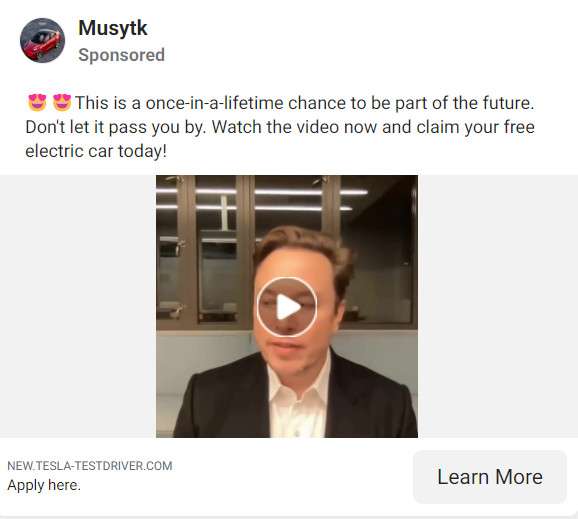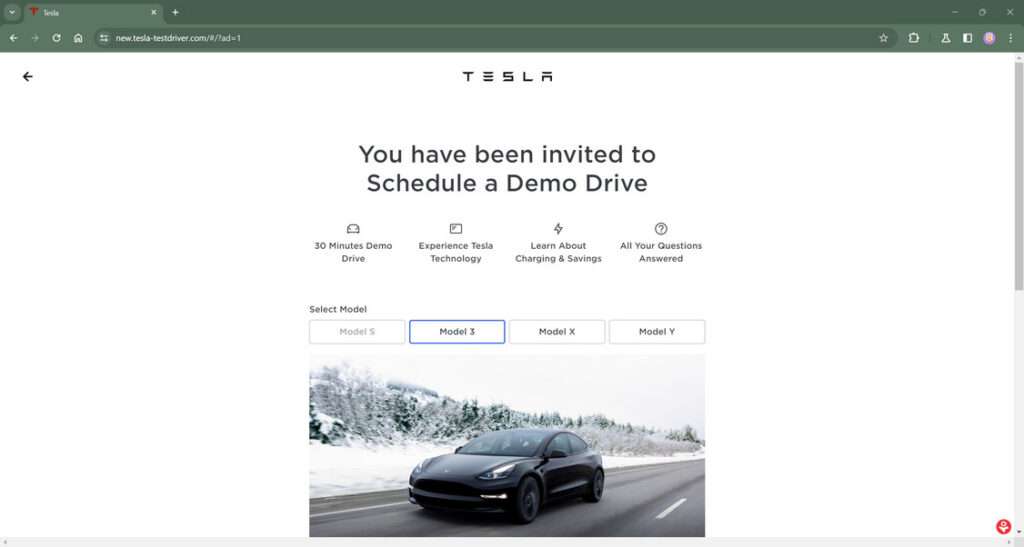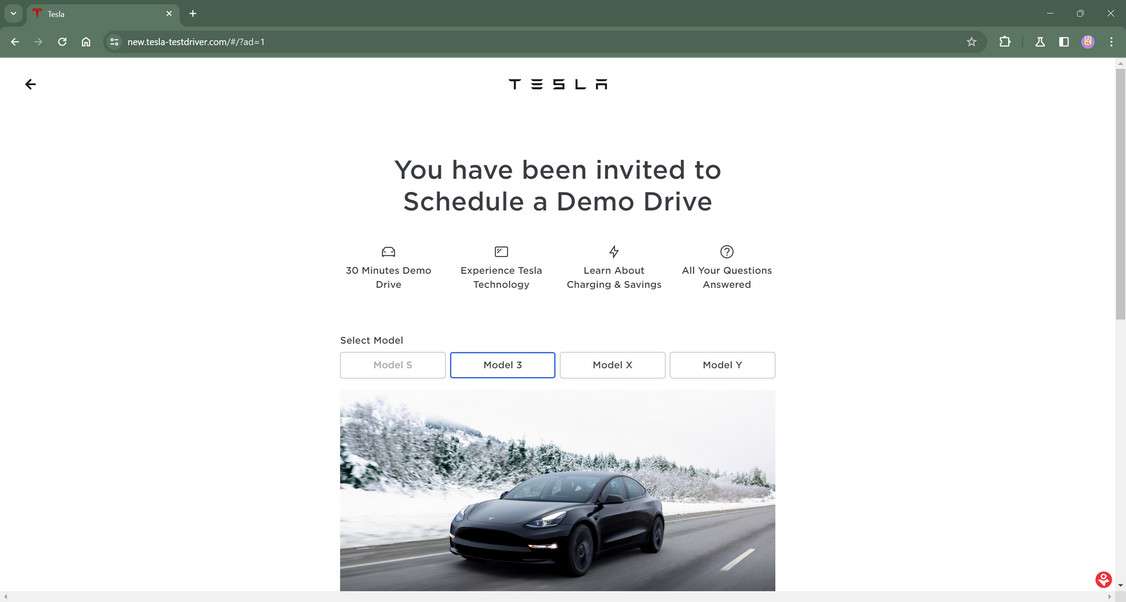A new scam has emerged on Facebook and other social media platforms, falsely claiming that Elon Musk and Tesla are looking for regular people to test drive Tesla vehicles for one year. The scam uses fake ads and websites that appear to be associated with Tesla, and asks for extensive personal information and identity documents from victims. This “1 Year Tesla Test Driver” scam is completely fake and likely an identity theft scheme originating from China. Elon Musk and Tesla have nothing to do with it.
- Overview of the Elon Musk “1 Year Tesla Test Driver” Scam
- How the Tesla Test Driver Scam Works Step-by-Step
- What Information Is Requested and Why It’s Dangerous
- How to Avoid Falling Victim to the Tesla Test Driver Scam
- How to Spot the Tesla Test Driver Scam on Facebook
- How to Identify the Scam on Instagram
- Keep an Eye Out for Scam TikTok Videos
- What to Do If You Already Shared Personal Information with the Scam
- Frequently Asked Questions About the Fake Tesla Test Driver Scam
- The Bottom Line on the “Elon Musk Tesla Test Driver” Scam
This article will provide an in-depth overview of how this dangerous Tesla test driver scam works, what to watch out for, and most importantly, how to protect yourself.


Overview of the Elon Musk “1 Year Tesla Test Driver” Scam
This scam typically starts with Facebook ads or posts that pretend to be from Tesla, offering regular people the chance to test drive Tesla vehicles for a full year. The ads and posts often use Elon Musk’s name and image without his consent.
Headlines for the fake ads include:
- “You’ve been selected to test drive a Tesla for one full year!”
- “We’re looking for 100 Tesla test drivers – Apply now!”
- “Elon Musk wants YOU to test drive the next Tesla for 1 year!”
If you click on the ad or post, you are taken to an official looking website such as “tesla-testdrivers.com” that claims to be associated with Tesla. The website requests extensive personal information from you, often saying it is required for a background check before you can become a test driver.
In reality, this is a scam website unaffiliated with Tesla, and is likely operated by scammers in China. The personal data collected is either used for identity theft, sold on the dark web, or used in other financial fraud schemes.
Elon Musk and Tesla are completely uninvolved with this scam. No such 1 year test drive program exists. Any mention of Elon Musk or using Tesla branding is unauthorized. The scam relies on the Tesla brand and Musk’s image to fool unsuspecting people.
How the Tesla Test Driver Scam Works Step-by-Step
Here is a step-by-step breakdown of how this scam typically operates:
1. Fake ads and posts on social media
The first point of contact for victims is usually a Facebook ad or post that pretends to be from Tesla and Elon Musk. The ads are often flashy with attention-grabbing headlines like “Test drive the next Tesla free for one year!” They may use Tesla logos and images of Tesla vehicles without permission.
The posts often claim that Tesla is looking for regular, everyday people to test prototype vehicles before release. Some say Tesla needs 100 test drivers, or that Elon Musk hand-picked certain people for this opportunity. These claims are false.
2. Clickbait websites make dubious claims
When you click on one of these ads or posts, you are redirected to a scam website that continues the ruse. The sites have official sounding names like “Tesla Product Testers,” “Tesla Consumer Testing,” or “Tesla Test Drivers.”
These websites feature Tesla branding and Elon Musk’s likeness used without permission. They make impressive sounding claims about being able to test drive Teslas for a year before the public gets them. Some say you’ll even be paid for it.
Of course, these claims are completely false. The websites are entirely fake and unaffiliated with Tesla. They are only designed to collect personal information.
3. Request for personal information and identity documents
The scam websites claim you need to provide personal details and identity documents for a background check before you can become a test driver. You are prompted to enter information like:
- Full name
- Email address
- Home address
- Phone number
- Date of birth
- Social security number
Some sites even ask for scanned copies of identity documents like your driver’s license, passport, or social security card. Others ask for a selfie video of you stating your name.
This is where the identity theft aspect comes into play. The scammers immediately have enough information to commit fraud in your name.
4. Fake terms and conditions
The scam sites have fine print “terms and conditions” that allow them to legally (in their minds) collect and use your data. The terms may include allowing your photo, video, and information to be shared publicly. This covers the scammers in case victims try to sue them later.
Of course, these terms don’t matter since the sites are fraudulent. But it demonstrates the scammer’s attention to detail.
5. Upsell for credit monitoring or other services
Some versions of the scam try to upsell victims on paid products after collecting their info. For example, you may see an offer for a credit monitoring service to “protect your identity” for a monthly fee.
This is further profit for the scammers. And entering payment information gives them even more data to steal.
6. Use of data for identity theft and fraud
Once submitted, the victim’s personal data and documents are used to commit identity theft. This may involve taking out loans or lines of credit, creating fake IDs, hacking accounts, and other forms of fraud.
The scammers can also sell the info on dark web marketplaces to other identity thieves worldwide. The possibilities for misuse are endless.
7. No Tesla test drive ever materializes
Of course, since this is all a scam, approved “applicants” never actually get to test drive a Tesla. There is no 1 year Tesla test drive program.
The scam relies entirely on collecting personal information under false pretenses. No car demonstrations will ever happen.
By following these steps, the scammers can effectively trick thousands into handing over sensitive personal data and ID documents. It is an efficient identity theft pipeline that requires very little work on their end. All they need is a scam website and some basic online ads.
What Information Is Requested and Why It’s Dangerous
As outlined above, the Tesla test driver scam asks for a startling amount of personal and identity information from victims:
- Full name – Gives scammers your identity to work with.
- Email address – Used to contact you and potentially hack other accounts.
- Home address – Enables physical identity theft.
- Phone number – Used for account verification by scammers.
- Date of birth – Key data point for identity verification.
- Social security number – The holy grail for US identity theft.
- Driver’s license – Provides all critical ID info in one image.
- Passport – Same as above for international scams.
- Social security card – The other key document for ID theft.
- Selfie video – Allows stealing your likeness using deepfakes.
With this data, scammers can replicate and impersonate you online and in the real world. They can open fraudulent accounts, take out loans, file taxes in your name, create fake IDs, and much more. Fake identities based on your documents can be sold over and over.
Handing over a Social Security number in particular gives scammers the keys to your entire identity and financial accounts. It must be protected at all costs.
This scam is therefore extremely dangerous from an identity theft perspective. Avoid providing any personal data to unfamiliar or untrusted sites online, especially those asking for identity documents.
How to Avoid Falling Victim to the Tesla Test Driver Scam
The best way to avoid this scam is simple – do not engage with suspect ads, posts, or websites making questionable claims about Tesla test drives. Here are specific tips:
- Avoid unlabeled ads – Be wary of flashy Facebook ads from unnamed Pages instead of Tesla’s official account.
- Verify domains – Inspect site URLs for odd domains unrelated to Tesla’s real website.
- Look for misspellings – Scam sites often have misspelled or slightly altered names.
- Do not share data – Never provide personal info or ID documents to unfamiliar sites.
- Contact Tesla – If unsure, contact Tesla directly via their official channels to verify an offer.
- Use sites safely – When using any website, look for HTTPS security in the URL and valid contact info.
- Guard all documents – Never photograph or share identity documents online unless absolutely necessary on trusted sites.
With vigilance and common sense, these types of data harvesting scams can be recognized and avoided. Don’t let the promise of a free Tesla cloud your judgment.
How to Spot the Tesla Test Driver Scam on Facebook
Facebook is a prime platform used to promote this scam through ads, posts, and fake pages. Here’s how to recognize it:
- Ads promoting unbelievable deals – Be suspicious of ads boasting unlikely claims like getting paid to test drive a Tesla for a year. Legitimate offers don’t need flashy ads.
- Posts sharing too-good-to-be-true offers – If you see a post sharing an improbable free Tesla test drive deal or selection process, it’s a scam.
- Pages impersonating Tesla – The ads and posts often come from pages named “Tesla Product Testers” or something similar pretending to be official. Check that pages are verified.
- Odd domains – Inspect the destination links. They may go to “tesla-testdrivers” or other real-sounding but fake domains unaffiliated with Tesla.
- Language and grammar errors – Scam ads and posts often have spelling, grammar, or formatting errors.
- Highly targeted – You may see the questionable ads only because you previously interacted with Tesla content. Scammers target those likely to be interested.
- Report suspicious ads – Use Facebook’s reporting tools if you suspect fraudulent offers or impersonator pages. Flag them as scams.
Stay vigilant against sketchy ads and posts dangled in front of Tesla fans. False guarantees designed to steal your data will always be too good to be true.
How to Identify the Scam on Instagram
Here are signs the Tesla scam is present on Instagram:
- Targeted ads promoting free test drives – Scam Instagram ads will appear in your feed touting incredible offers tailored to Tesla enthusiasts.
- “Sponsored” label but uncertified account – The ads come from accounts impersonating Tesla’s name and branding without actually being sponsored or verified.
- Highly-designed graphics – Ad creative will be slick and eye-catching, structured specifically to entice Tesla fans.
- Link in bio – The Instagram account profile will have a link in the bio leading to the phishing site instead of Tesla’s real website.
- Comments disabled – To prevent exposure, the Instagram posts will likely have comments disabled.
- No blue verification checkmark – Legitimate brands have a blue verification checkmark icon that will be missing on scammer accounts.
- Report to Instagram – Use Instagram’s reporting tools to flag fraudulent accounts and get their scam ads removed.
The too-good-to-be-true Tesla test drive offers on Instagram are designed to lure in fans. But learning to recognize the scam signs can keep your data safe.
Keep an Eye Out for Scam TikTok Videos
On TikTok, here’s what to look for with the Tesla scam:
- Branded hashtags – Watch for Tesla-related hashtag trends to be infiltrated with scam videos using hashtags like #Tesla #ElonMusk #FreeTeslaTestDrive.
- Video captions making dubious claims – Scam TikTok videos will have captions claiming you can get paid to test drive a Tesla for up to a year.
- High view counts – The scam videos may rapidly accumulate views and engagement from unsuspecting users.
- Links in bios – Like on Instagram, scam TikTok accounts put phishing links in bios instead of pointing to Tesla’s real site.
- Duplicate videos – Scammers may duplicate the same scam video across multiple accounts to avoid takedowns.
- Overlay graphics obscuring @names – Scam accounts often add graphics over the @username to hide changed handles after being banned.
- Report suspicious videos – Use TikTok’s integrated reporting option to flag any videos or accounts tied to fake Tesla offers.
The scam has adapted to target Tesla communities across major social platforms. But learning the warning signs can help users stay vigilant and avoid being deceived.
What to Do If You Already Shared Personal Information with the Scam
If you already provided personal data or identity documents to a suspected Tesla test drive scam website, take these steps immediately:
1. Monitor accounts and credit reports
Check all your financial accounts and credit reports for any signs of fraudulent activity. Consider signing up for a credit monitoring service to stay on guard.
2. Change passwords and enable two-factor authentication
Reset all account passwords to strong, unique phrases. Turn on SMS or app-based two-factor authentication wherever possible.
3. Place fraud alerts and freezes
Place a 90-day initial fraud alert on your credit reports. Consider an extended 7-year fraud alert or credit freeze if identity theft is confirmed.
4. Watch for other phishing scams
Scammers with your email may increase phishing attempts via email. Carefully inspect any correspondence and do not click suspicious links or attachments.
5. File an FTC identity theft report
File a report with the FTC’s identity theft reporting system at IdentityTheft.gov. This helps create a recovery plan and investigation.
6. Contact banks and other agencies
If identity theft occurs, contact affected banks, lenders, government agencies, etc. to report fraudulent activity in your name. Close any unauthorized accounts.
7. Consider a police report
File a police report about the identity theft. This creates an official record and may help recover funds.
With quick action, you can minimize potential damage from any personal data unwittingly shared with scammers. But avoiding the scam entirely is the best option.
Frequently Asked Questions About the Fake Tesla Test Driver Scam
Many people have questions about the “1 Year Tesla Test Drive” scam aiming to steal personal information. Here are answers to some frequently asked questions:
Is the Tesla test drive offer real?
No. This scam has no connection to Tesla or Elon Musk. There is no program for regular people to test prototype Teslas long-term. Any offer is fake.
How do scammers promote the scam online?
Scammers use Facebook ads, Instagram sponsored posts, TikTok videos, and other social media to promote the scam. Posts pretend to be from Tesla and tout unbelievable deals.
What tricks do they use?
Tactics include fake Tesla-branded pages, imitation websites, doctored images of Elon Musk, and language targeting Tesla fans. The scam ads are highly customized to appeal to specific users.
What information do they ask for?
Scam sites collect personal info like your name, email, home address, phone number, date of birth, and social security number. Some request scanned IDs and selfie videos.
Can they really steal my identity?
Yes. Handing over documents like driver’s licenses or social security cards provides all the data needed to perform identity theft and ruin your finances.
Should I click on Tesla ads promoting free test drives?
No. Any unbelievable Tesla test drive offer requiring extensive personal data is undoubtedly a scam. Do not click on suspect ads, posts, or questionable links.
How can I spot the scam on social media?
Look for too-good-to-be-true offers, fake looking pages, and sites with odd domains. Check for verification badges on accounts. Scan for grammar and spelling errors.
What if I already shared information with the scammers?
If you handed over personal data, immediately monitor your credit and accounts for fraud. Place fraud alerts, reset passwords, and consider reporting identity theft if your identity is misused.
Should I sign up to test drive a Tesla for a year?
No, unless you are selected by Tesla officially, which is extremely rare. Be skeptical of anyone claiming to offer paid or lengthy Tesla test drives. Contact Tesla to verify any unbelievable offers.
How can I avoid becoming a victim?
Avoid sharing personal data online. Learn to recognize tactics scammers use like fake ads, posts, and too-good-to-be true deals. Report suspicious offers when you see them.
Staying vigilant online and verifying any unbelievable offers directly with Tesla are the best ways to avoid this data harvesting scam.
The Bottom Line on the “Elon Musk Tesla Test Driver” Scam
In summary, this Elon Musk and Tesla test driver scam is completely fake and solely intends to steal people’s personal information and identity documents.
- Legitimate-looking Facebook ads pretend Tesla wants you to test drive vehicles for a year. They appear tied to Elon Musk and Tesla but have no actual affiliation.
- Clicking the ads leads to convincing but fraudulent “Tesla testing” websites that harvest extensive personal data for identity theft purposes.
- No actual Tesla test drive program exists. The scam relies entirely on stealing and misusing your private data.
- Avoid sharing any personal details or identity documents with unfamiliar sites online. Recognize common online scam tactics like too-good-to-be-true offers.
- If you did share data, take immediate steps to monitor your identity and accounts for fraudulent misuse. Consider filing a police report.
Be vigilant against increasingly sophisticated online scams aiming to steal personal information. When an offer looks fishy, it almost always is. Protect yourself by recognizing the techniques scammers use and refusing to hand over your valuable data. Don’t become another victim of the dangerous Tesla test driver scam.




